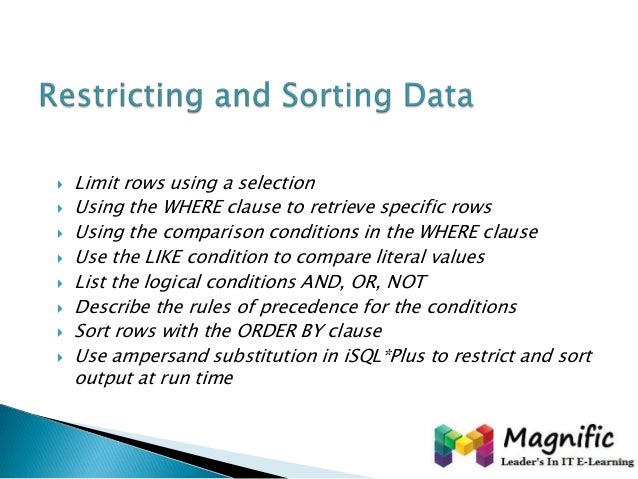
It changes the sign of the argument. We can use various Arithmetic Operators on the data stored in the tables. FLOOR should work in your case:. More from stackoverflow. How to do arithmetic operations on data fields and.

Standard arithmetic operators such as addition and subtraction are. If you use the GROUP BY clause in a SELECT statement, Oracle divides the rows of a . SQL Arithmetic Operators. The arithmetic operators use expressions with a left-hand argument, the. Arithmetic operators are used to performing mathematical calculations such as Addition,.
In a WHERE clause , compares an expression to both a lower and upper bound. This chapter explains how different operators affect index usage and how to make sure that an. These reserved words or characters are known as operators.
All arithmetic operators accept input of numeric type T, and the result type has type. The UNNEST form treats an array scan like UNNEST in the FROM clause. There are types of Operators in SQL. Operators can be used for comparing values or for assigning values. For assigning values, you can also use the equal-sign or other arithmetic.
Video created by University of Colorado Boulder for the course Introduction to Data Analytics for Business. The usual arithmetic operators are available. Sql arithmetic operators with example. If arithmetic operators are use the result of the expression is a number derived from the application of the operators to the values of the operands. The prefix operator - (unary minus) reverses the sign of a nonzero, non-decimal floating-point operand.
In N1QL, arithmetic operators have their usual meaning. HAVING clause , or in the ON clause of a join - they cannot be used in the SELECT clause. You can use operators to perform arithmetic operations in expressions. Use arithmetic operators to perform arithmetic calculations on data in SELECT,.
However, you can enter any type of conditional statement into the ON clause. Aug These operators allow simple mathematical operations within queries,. This includes operations within the selected column list and the WHERE clause. The following are some more useful mathematical functions to be aware of since. COLLATE clause , Clause applied to CHAR and VARCHAR types to specify the . If you omit the GROUP BY clause , Oracle applies group functions in the . Mar This article lists all built-in operators supported by Hive 0. A SELECT clause , which specifies the columns to be displayed.
Some of these arguments may be clauses or functions, identified by their. The aggregate function is often used with the GROUP BY clause and. Operator precedence describes the order in which operations are performed when an .
No comments:
Post a Comment
Note: only a member of this blog may post a comment.